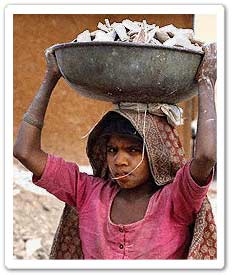 We
fight for our rights at home for almost everything from late nights to going
out of station with friends. We chat about human rights with our parents,
teachers and friends. But have we ever thought about the children who are
forced to work and do not even have basic rights?
We
fight for our rights at home for almost everything from late nights to going
out of station with friends. We chat about human rights with our parents,
teachers and friends. But have we ever thought about the children who are
forced to work and do not even have basic rights?
India has the largest number of children employed than any other country in the world. According to the statistics provided by The Government of India around 90 million out of 179 million children in the six to 14 age group do not go to school and are engaged in some occupation or other. This means that close to 50 per cent of children are deprived of their right to a free and happy childhood.
Unofficially, this figure exceeds 100 million but the fact that a large number of these children work without wages in fields or in cottages alongside their parents, unreported by census, makes it very difficult to estimate accurately. However, it is estimated that if these working children constituted a country, it would be the 11th largest country in the world.
A large number of children work in cottage industries producing carpets, matches, firecrackers, bidis, brassware, diamond, glass, hosiery, hand loomed cloth, embroidery, leather goods, plastic, bangles and sporting goods. The highest number of children are found working in the agricultural sector.
Poverty has often been cited as the reason for the child labour problem in India. While it is true that the poorest, most disadvantaged sectors of Indian society suply the vast majority of child labourers, child labour actually creates an perpetuates poverty as it displaces adults from their jobs and also condemns the child to a life of unskilled badly paid work.
Merely passing laws is obviously not the solution, as they need to be enforced, in which our country has a poor track record. What are the causes for child labour? One can attribute it to various factors -- unemployment, low wages, poor standards of living, ignorance and illiteracy, social attitudes, and the like. Together they culminate in poverty and exploitation. The poor would rather have children who work to supplement the income. There are many cases where the parents sell their children as bonded labour for a petty sum of money. Banning child labour therefore is not the solution, nor is the step by the U.S. and Europe to ban carpets from India.
Ignorance is one of the main problems; ignorance on the part of the parents who believe that with the children working, poverty will be eradicated; and ignorance on the part of the children who do not know their rights in this country. The working conditions of the children are inhuman and the incomes given are also meagre. Eighty per cent of the children work in hazardous conditions.
At present, the legislations in India only specifically outlaw child labour in designated hazardous industries and bonded child labour, but both Article 24 of the Indian Constitution and Section 67 of the Factories Act explicitly direct that children below the age of 14 years are not to work in factories. In addition, the Child Labour (Prohibition and Regulation) Act 1986 forbids the employment of children in specified hazardous industries.
The Supreme Court ruling of December 10, 1996, in an attempt to fill the loopholes left in previous legislation and to bring in judicial activism to social issues ordered the setting up of a fund for the child workers aimed at controlling and eventually eliminating child labour across the length and breadth of the entire country. While setting out a long list of child labour monitoring obligations of the State Governments, it also prescribes heavy fines for employers caught with children at work. In addition, India has ratified the UN Convention on the Rights of the Child.

Laws pertaining to Child Labour:
- Children [Pledging of Labour] Act (1933)
- Employment of Children Act (1938)
- The Bombay Shop and Establishments Act (1948)
- Child Labour -Prohibition and Regulation Act
- The Indian Factories Act (1948)
- Plantations Labour Act (1951)
- The Mines Act (1952)
- Merchant Shipping Act (1958)
- The Apprentice Act (1961)
- The Motor Transport Workers Act (1961)
- The Atomic Energy Act (1962)
- Bidi and Cigar Workers (Condition of Employment) Act (1966)
- State Shops and Establishments Act
In June 1998, when the International Labour Conference (ILO) will debate a new Convention on Child Labour, a huge motivated and determined group of people will swarm the streets of Geneva. Coming from five continents and marching for five months, they comprise the Global March Against Child Labour.
The marchers may have traveled by bus, plane, boat or may have walked some distance. They may have taken over "the torch" from other marchers along the road. They will end up in Geneva to mark the importance of the ILO discussions.
Though the March is spearheaded by a few select organisations working on various issues related to human rights, we think that the real strength lies with you -- the general people. The pith of this movement is the actual junta. Issues of child labour has reached such demonic proportions that until the people at the grassroots are mobilised enough, desired results will remain a far away dream. The Global March is but a fraction of our continuous efforts towards stopping child labour globally, and to make it a success, every sincere offer of help is welcome.
Marching along with the Core Marchers is not the only way to express your concern for this scourge. Every person, individually or collectively, can affect a change if he/she is sensitive and observant to this growing menace. You may be a student or a teacher, a parent or a child, an employee or an employer, each of you can help make the March and its cause reach the cherished goal.
What we demand is not impossible, neither is child labour the 'normal' process of a developing economy, as some groups will want you to believe. The use and abuse of these little souls is an unpardonable sin. Simply blaming the ineffectiveness of the laws and lackadaisical attitude of the lawmakers will not absolve us of our responsibility. The roots of this growing affliction has the capacity and strength to grow deeper and wider unless every heart, every mind and everybody sheds the complacent attitude and makes small but significant steps towards its complete elimination.
No Barbie for me; A hacksaw if you please"It's finally happened", the old bearded man in red uttered in sheer disgust. "The world has gone to the dogs," he thought aloud. Standing alone in the dark night, he looked as vehicles whizzed past him, and through him, with uncaring ferocity. Merriment and festivity filled the air as brightly-lit homes exuded an atmosphere of festivity and opulence.
It wasn't as if he hadn't been warned. "There will come a time when no one will be able to see you," his `Father' had told him. (He always referred to God as `Father'). "Why can nobody see me," the old man asked.
 "Hadn't I told you earlier that you won't be visible to the wicked,
treacherous, liars, backbiters, putrid schemers, thieves, cheaters .....?"
asked God. "So what? None of the grown ups can see me even now. Its
only the children and don't tell me they would turn into such vile
creatures," argued the old man.
"Hadn't I told you earlier that you won't be visible to the wicked,
treacherous, liars, backbiters, putrid schemers, thieves, cheaters .....?"
asked God. "So what? None of the grown ups can see me even now. Its
only the children and don't tell me they would turn into such vile
creatures," argued the old man.
"Okay, don't believe me," God shrugged helplessly, "just wait till they invent television." He hadn't believed God then. But then, God had that notoriously bad habit of being right. Now he stood there lonely, alone facing the silence that confronted him, nostalgic about the past when he and his `jingle bells' were eagerly awaited. The children would spell out their wishes and he would grant them their wildest desires.
"You there old man, move!" A shrill voice commanded him. He turned and faced a dirty-looking kid with a hardened face looking irritatingly at him. The old man was stupefied, "You can actually see me?" he asked. "You crazy or what? " retorted the child. "Just tell me, can you really see me?" The old man was almost shouting now. The kid started to walk away. " Wa... Wait. Stop," the man shouted. He did not want to lose the only person he could talk with. "Come back. I'm not quite feeling alright now. Could you please talk to me for a while?" he was almost pleading. The boy turned back.
"I understand," winked the boy knowingly, "You're just BPT, isn't it." "BPT?" The old man looked perplexed. "Bewda Peeke Tight. Ha! Ha! Ha!", the child explained and burst into peals of laughter. The laughter sounded strange especially coming from a person who appeared incapable of relishing the finer shades of life. But when he saw the sad look on the face of the old man, the child was filled with shame.
"Sorry, uncle", he apologised. "Whether you drink or not is none of my business. In fact, my father drinks like a fish everyday." "No need to apologise son. I didn't mind anything you just said. For that matter, I'm not even drunk now," said the old man understandingly. "You don't appear to now, but a while ago you were talking just like my father and walking on the middle of the road. So I thought ......." The boy paused.
"Say, anyway isn't it an odd time to be roaming about, its almost midnight?" queried the old man. "Yes, of course, I'm usually at the factory at this time. They leave us usually at 1 am, but you know because of all these riots, the supervisor left us early," pat came the reply. "You work in a factory ?" The old man was astonished. "Don't you go to school?" "Sure, I do, thrice a week. Mondays, Wednesdays, Fridays. I have to go to the factory on other days, Ramu goes to school on Tuesdays, Thursdays and Saturdays." "Who's Ramu ? "asked the old man. "My little brother. He's only this high," the boy touched his knee, palm stretched out and downwards. "and still he can easily pick you up and throw you down. Of course, he cannot pick me up and throw me down but then he's only this high. "He once more pointed to his knee.
Matters were getting complicated for the old man. The rest of the dialogue followed thus -- "Won't your studies suffer?" "What is that ?" "Don't you study ?" "No." "You do not go to school to study?" "No. We go to clean up all the rooms, with all those big black and green slates with cloth and water and take all the kachra and dump it in the street." "Don't your parents scold you for not going to school?"
The boy's eyes being moist. "I want to go to school carrying books and wearing white shirts and blue pants. My father doesn't allow me to. I asked him once when Shamu started going to school in uniform and with brown books. He beat me up and said that reading books and going to school causes one to lose his God." "But that's idiotic, crazy. I never heard a thing so ridiculous before," the old man shouted. "I know, I guess even father knows it. Its just that we do not have enough money to pay for the school. And then if I go to the school who will go to the factory?", the boy looked soulfully at the old man. He understands nothing, he thought. He was right. The old man was stupefied, he didn't know how he could bring cheer to the only person who could see him. And it was his job to make the boy happy, if he could. He thought the best way out would be to ask him. "What would you like to have? Just tell me. See here, in this sack I've just about all the toys in the world."
 "But
what in the world would I possibly need a toy for?" "Don't tell
me you do not like toys. Children love toys, they bring a sparkle to a
child's being, everyone wants a toy, everyone needs a toy," the old
man declared. "But I don't," the boy replied, "When would I
play with them?"
"But
what in the world would I possibly need a toy for?" "Don't tell
me you do not like toys. Children love toys, they bring a sparkle to a
child's being, everyone wants a toy, everyone needs a toy," the old
man declared. "But I don't," the boy replied, "When would I
play with them?"
"Just look at this sweet little Barbie," the old man continued "and this is a G.I.Joe, here's a He-Man, take your pick. If you like cars, I've a whole lot of them, battery operated and remote controlled, the latest and the best. I have aeroplanes and helicopters and I have a dog that barks, a cat that mews, a donkey that brays and a doll that says 'mama, papa, good day. And a house of cards, chess, carom board, darts, checkers. I also have computer games, TV games, ...... "
"Do you have a hacksaw blade?" the boy asked hesitatingly. "What? A hacksaw blade? What's that ?" The old man was bowled. "A blade that's fixed in a hacksaw. You see I broke one today, they will cut my pay for today. So do you have one?" the boy pleaded. The old man rummaged through his sack. It had everything he felt would bring cheer and happiness to a child. Till now, that is. He looked and looked and finally gave up.
"It isn't there, is it?" Seeing the hopeless look on the face of the old man, the boy said: "It's okay. Thanks anyway for trying to help. I'll go now, its getting late."
"Wait," shouted the old man, "look here's a golden
sword, a magic lamp, a do-it-yourself kit, WAIT, anything you want, its
there." The boy didn't turn back this time. He was already late for
work.
By Ilias Ahmed






